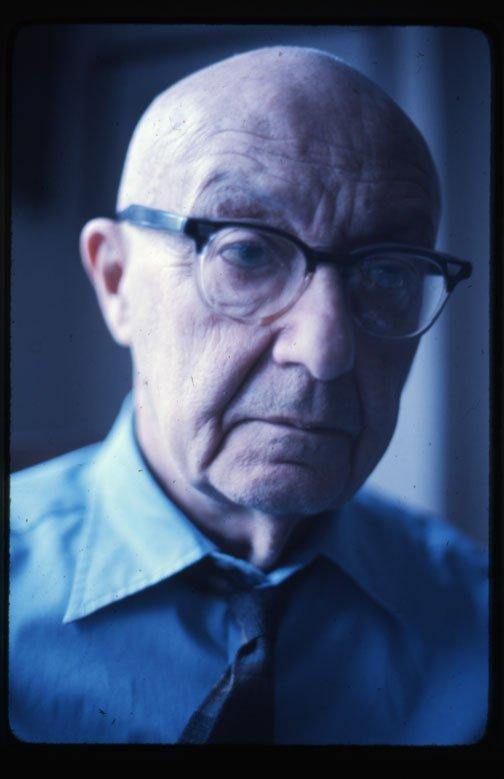De Amerikaanse dichter Charles Reznikoff werd op 30 augustus 1894 in New York geboren. Zie ook alle tags voor Charles Reznikoff op dit blog.
His mother stepped about her kitchen
His mother stepped about her kitchen, complaining in a low
voice;
all day his father sat stooped at a sewing machine.
When he went to high school Webber was in his class.
Webber lived in a neighborhood where the houses are set in
lawns with trees beside the gutters.
The boys who live there, after school, take their skates and
hockey sticks and play in the streets until nightfall.
At twelve o’clock the boys ran out of school to a lunchroom
around the corner.
First come, first served, and they ran as fast as they could.
Webber would run up beside him and knock him against the
wall.
He tried not to mind and thought Webber would tire of it.
One day he hit Webber’s side; his fist fell off Webber’s over-
coat. Webber turned with a glad shout and punched him
as he cowered.
His home was in a neighborhood of workingmen where there
were few Jews.
When he came home from school he walked as quickly as he could,
his head bowed and cap pulled low over his face.
Once, a few blocks from home, a tall lad stopped him.
“Are you a Jew? I knock the block off every Jew I meet.”
“No,” he answered.
“I think you’re a Jew. What’s your name?” He told him,
glad that his name was not markedly Jewish and yet foreign
enough to answer for his looks.
“Where do you live?” He told him and added, “Come around
any old time and ask about me.” So he got away.
When he was through high school he worked in the civil
service as a typist, taken on until a rush of business was
over.
He took the test for a steady job, but his standing on the list
was low,
unlikely to be reached for a long time, if ever before the new list.
Looking for work, he always came upon a group waiting for
the job.
He was short and weak-looking, and looked peevish. He could
not get work for months.
At last an old German storekeeper wanted to hire him and
asked at what he had been working. He told him.
“It doesn’t pay me to break you in, if you are going to leave
me. Have you taken another civil service test? Are you
waiting for a new appointment?”
“No,” he answered.
In a few months a letter came to his home from the civil
service board, asking him to report for work as a typist, a
permanent appointment.
There was no hurry, but his father did not know and so
brought the letter to the store.
There had been a boy in his class at school whose name was
Kore.
Kore was short, too, but he had the chest of an old sailor and
thick, bandy legs. He shouted when he spoke and was
always laughing.
Kore moved into the block. With Kore he was not afraid to
stand on the stoop after work or go walking anywhere.
Once they went to Coney Island and Kore wanted to go
bathing. It was late at night and no one else was in.
They went along the beach until they came to the iron pier the
steamboats dock at.
Kore boasted that he would swim around the pier and slid
away into the black water.
At last the people were gone. The booths were long darkened.
He waited for Kore at the other side of the pier, watching the
empty waves come in.
ZONDAGWANDELINGEN IN DE VOORSTAD
1.
Op stenen bemost met heet stof, geen beschutting dan de dunne, nutteloze schaduwen
van bermgrassen;
de duisternis van het bos in, starend naar de blauwe bloemen op dunne stelen
als draden.
Het groene slijm – een struikgewas van jonge bomen die in bruin water staan;
met knobbels als spieren strekt een naakte boom zich uit,
dood; en een dode eend, met zijn kop onder water alsof hij duikt.
Het is eb. Er is alleen nog een poel over in de stinkende modder van de kreek.
Iemand heeft een wasketel weggegooid.
Op de oever een hoop blikjes;
ratten, bedekt met roest, kruipen in en uit.
De witte randen van de wolken als aders in een steen.
2
Bange honden die achteruit kijken met geduldige ogen;
bij ramen bukken oude vrouwen, gewikkeld in sjaals;
oude mannen, gerimpeld als knokkels, op de stoep.
Een teef, ruggengraat en ribben in de kromme rug,
snuffelde naar eten, haar gezwollen uier schuurde bijna over het trottoir.
Een tandeloze vrouw opende eens haar deur,
kauwend op een plakje spek dat als een tong uit haar mond hing.
Di is waar ik nacht na nacht liep;
Di is waar ik vele jaren wegliep.
Vertaald door Frans Roumen

Zie voor nog meer schrijvers van de 30e augustus ook mijn blog van 30 augustus 2019 en ook mijn blog van 30 augustus 2017 en ook mijn blog van 30 augustus 2016.
